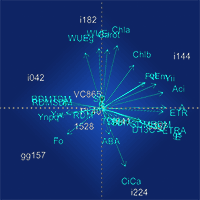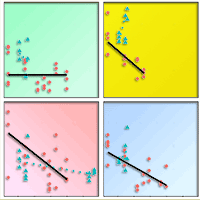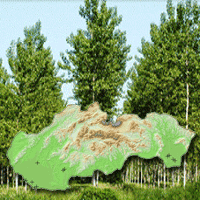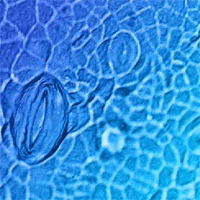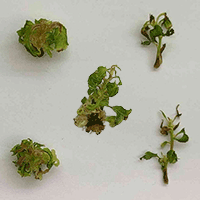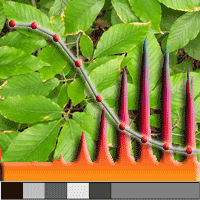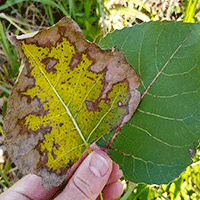There is an increasing interest in using plant growth-promoting rhizobacteria (PGPR) to improve hybrid poplar performance under water stress conditions. We assessed the growth and leaf-level physiological responses of different hybrid poplar clones to the inoculation of a microbial consortium and subjected to moderate water shortage. In a nursery experiment, growth, leaf gas exchange, and biomass partitioning traits were assessed during one growing season on twenty hybrid clones from interspecific crosses of Populus trichocarpa × P.deltoides and (P. trichocarpa × P. deltoides) × P. deltoides, which were submitted to two treatments of PGPM inoculation (Inoculated, Inoc_1 vs. non-inoculated, Inoc_0) and two irrigation treatments (full water vs. water restriction). The water restriction decreased shoot growth, photosynthetic rate (Asat), and stomatal conductance (gs); increased intrinsic water use efficiency (WUEint) of the hybrid clones but it did not change the root-to-shoot ratio. Unlike our expectations, by the end of the study, treatment Inoc_1 slightly decreased basal diameter (D) and height (H) relative to Inoc_0 (5.8% and 5.2 %, respectively). Moreover, seven clones significantly decreased the root biomass by 37% to 62% in the Inoc_1 relative to Inoc_0 treatment, while the other clones showed no response to the inoculation. Oppositely, while most of the clones showed no response to the Inoc_1 treatment on leaf-physiological traits compared to Inoc_0, some of them exhibited an increase of Asat of 15% to 39%. Overall, the consortium applied did not improve the responses to the water restriction, and responses to the inoculation were more associated with a deleterious than a growth-promoting effect, which is discussed in the context of nutrient immobilization, application method, and timing.
Keywords
, , , ,
Citation
Yáñez MA, Espinoza S, Ovalle J, Magni C, Martínez-Herrera E (2023). Variations in the performance of hybrid poplars subjected to the inoculation of a microbial consortium and water restriction. iForest 16: 352-360. - doi: 10.3832/ifor4378-016
Academic Editor
Claudia Cocozza
Paper history
Received: May 11, 2023
Accepted: Sep 30, 2023
First online: Dec 13, 2023
Publication Date: Dec 31, 2023
Publication Time: 2.47 months
© SISEF - The Italian Society of Silviculture and Forest Ecology 2023
Open Access
This article is distributed under the terms of the Creative Commons Attribution-Non Commercial 4.0 International (https://creativecommons.org/licenses/by-nc/4.0/), which permits unrestricted use, distribution, and reproduction in any medium, provided you give appropriate credit to the original author(s) and the source, provide a link to the Creative Commons license, and indicate if changes were made.

Breakdown by View Type
(Waiting for server response...)
Article Usage
Total Article Views: 14696
(from publication date up to now)
Breakdown by View Type
HTML Page Views: 11687
Abstract Page Views: 1586
PDF Downloads: 1084
Citation/Reference Downloads: 0
XML Downloads: 339
Web Metrics
Days since publication: 779
Overall contacts: 14696
Avg. contacts per week: 132.06
Article Citations
Article citations are based on data periodically collected from the Clarivate Web of Science web site
(last update: Mar 2025)
(No citations were found up to date. Please come back later)
Publication Metrics
by Dimensions ©
Articles citing this article
List of the papers citing this article based on CrossRef Cited-by.
(1)
Aira M, Gómez-Brandón M, Lazcano C, Baath E, Domínguez J (2010)Plant genotype strongly modifies the structure and growth of maize rhizosphere microbial communities. Soil Biology and Biochemistry 42: 2276-2281.
CrossRef |
Gscholar
(2)
Anand R, Chanway C (2013)N
2-fixation and growth promotion in cedar colonized by an endophytic strain of
Paenibacillus polymyxa. Biology and Fertility of Soils 49: 235-239.
CrossRef |
Gscholar
(3)
Andreote F, Gumiere T, Durrer A (2014)Exploring interactions of plant microbiomes. Scientia Agricola 71: 528-539.
CrossRef |
Gscholar
(4)
Araya-Osses D, Casanueva A, Román-Figueroa C, Uribe JM, Paneque M (2020)Climate change projections of temperature and precipitation in Chile based on statistical downscaling. Climate Dynamics 54: 4309-4330.
CrossRef |
Gscholar
(5)
Backer R, Rokem JS, Ilangumaran G, Lamont J, Praslickova D, Ricci E, Subramanian S, Smith DL (2018)Plant growth-promoting rhizobacteria: context, mechanisms of action, and roadmap to commercialization of biostimulants for sustainable agriculture. Frontiers in Plant Science 9.
CrossRef |
Gscholar
(6)
Bal A, Chanway CP (2012)15N foliar dilution of western red cedar in response to seed inoculation with diazotrophic
Paenibacillus polymyxa. Biology and Fertility of Soils 48: 967-971.
CrossRef |
Gscholar
(7)
Boyer CR, Torbert HA, Gilliam CH, Fain GB, Gallagher TV, Sibley JL (2012)Nitrogen immobilization in plant growth substrates: clean chip residual, pine bark, and peatmoss. International Journal of Agronomy. 2012: e978528.
CrossRef |
Gscholar
(8)
Ciccillo F, Fiore A, Bevivino A, Dalmastri C, Tabacchioni S, Chiarini L (2002)Effects of two different application methods of Burkholderia ambifaria MCI 7 on plant growth and rhizospheric bacterial diversity. Environmental Microbiology 4: 238-245.
CrossRef |
Gscholar
(9)
Compant S, Samad A, Faist H, Sessitsch A (2019)A review on the plant microbiome: ecology, functions, and emerging trends in microbial application. Journal of Advanced Research 19: 29-37.
CrossRef |
Gscholar
(10)
De Lima BC, Moro AL, Santos ACP, Bonifacio A, Araujo ASF, De Araujo FF (2019)Bacillus subtilis ameliorates water stress tolerance in maize and common bean. Journal of Plant Interactions 14: 432-439.
CrossRef |
Gscholar
(11)
Del Pozo A, Brunel-Saldias N, Engler A, Ortega-Farias S, Acevedo-Opazo C, Lobos GA, Jara-Rojas R, Molina-Montenegro MA (2019)Climate change impacts and adaptation strategies of agriculture in Mediterranean-Climate Regions (MCRs). Sustainability 11: 2769.
CrossRef |
Gscholar
(12)
Di Matteo G, Nardi P, Verani S, Sperandio G (2015)Physiological adaptability of Poplar clones selected for bioenergy purposes under non-irrigated and suboptimal site conditions: a case study in Central Italy. Biomass and Bioenergy 81: 183-189.
CrossRef |
Gscholar
(13)
Ferreira AS, Pires RR, Rabelo PG, Oliveira RC, Luz JMQ, Brito CH (2013)Implications of Azospirillum brasilense inoculation and nutrient addition on maize in soils of the Brazilian Cerrado under greenhouse and field conditions. Applied Soil Ecology 72: 103-108.
CrossRef |
Gscholar
(14)
Fischer D, Chapman S, Classen A, Gehring C, Grady K, Schweitzer J, Whitham T (2014)Plant genetic effects on soil under climate change. Plant and Soil 379: 1-19.
CrossRef |
Gscholar
(15)
Giovannelli A, Deslauriers A, Fragnelli G, Scaletti L, Castro G, Rossi S, Crivellaro A (2007)Evaluation of drought response of two poplar clones (
Populus×canadensis Mönch ‘I-214’ and
P. deltoides Marsh. ‘Dvina’) through high resolution analysis of stem growth. Journal of Experimental Botany 58: 2673-83.
CrossRef |
Gscholar
(16)
Grunert O, Reheul D, Van Labeke M-C, Perneel M, Hernandez-Sanabria E, Vlaeminck SE, Boon N (2016)Growing media constituents determine the microbial nitrogen conversions in organic growing media for horticulture. Microbial Biotechnology 9: 389-399.
CrossRef |
Gscholar
(17)
Guttman DS, McHardy AC, Schulze-Lefert P (2014)Microbial genome-enabled insights into plant-microorganism interactions. Nature Reviews Genetics 15: 797-813.
CrossRef |
Gscholar
(18)
Hacquard S, Schadt CW (2015)Towards a holistic understanding of the beneficial interactions across the
Populus microbiome. The New Phytologist 205: 1424-1430.
CrossRef |
Gscholar
(19)
Hashem A, Tabassum B, Fathi AbdAllah E (2019)Bacillus subtilis: a plant-growth promoting rhizobacterium that also impacts biotic stress. Saudi Journal of Biological Sciences 26: 1291-1297.
CrossRef |
Gscholar
(20)
Havlin J, Tisdale S, Beaton J, Nelson W (2005)Soil fertility and fertilizers: an introduction to nutrient management (7th edn). Pearson Education Inc., New Jersey, USA, pp. 515.
Gscholar
(21)
Igiehon NO, Babalola OO (2018)Below-ground-above-ground plant-microbial interactions: focusing on soybean, rhizobacteria and mycorrhizal fungi. The Open Microbiology Journal 12: 261-279.
CrossRef |
Gscholar
(22)
Jang J, Kim S-H, Khaine I, Kwak M-J, Lee H, Lee T, Lee W, Woo S-Y (2018)Physiological changes and growth promotion induced in poplar seedlings by the plant growth-promoting rhizobacteria Bacillus subtilis JS. Photosynthetica 56: 1188-1203.
CrossRef |
Gscholar
(23)
Larchevêque M, Maurel M, Desrochers A, Larocque GR (2011)How does drought tolerance compare between two improved hybrids of balsam poplar and an unimproved native species? Tree Physiology 31: 240-249.
CrossRef |
Gscholar
(24)
Liu D, Fang S, Tian Y, Dun X (2014)Seasonal and clonal variations of microbial biomass and processes in the rhizosphere of poplar plantations. Applied Soil Ecology 78: 65-72.
CrossRef |
Gscholar
(25)
Lugtenberg B, Kamilova F (2009)Plant-growth-promoting rhizobacteria. Annual Review of Microbiology 63: 541-556.
CrossRef |
Gscholar
(26)
Mercado-Blanco J, Abrantes I, Barra Caracciolo A, Bevivino A, Ciancio A, Grenni P, Hrynkiewicz K, Kredics L, Proença DN (2018)Belowground microbiota and the health of tree crops. Frontiers in Microbiology 9: 1112.
CrossRef |
Gscholar
(27)
Mikajlo I, Pourrut B, Louvel B, Hynšt J, Záhora J (2023)Plant-soil nitrogen, carbon and phosphorus content after the addition of biochar, bacterial inoculums and nitrogen fertilizer. Journal of Plant Nutrition 46: 541-555.
CrossRef |
Gscholar
(28)
Molina-Romero D, Baez A, Quintero-Hernandez V, Castañeda M, Fuentes-Ramirez L, Bustillos M, Rodríguez-Andrade O, Morales-García Y, Munive A, Muñoz-Rojas J (2017)Compatible bacterial mixture, tolerant to desiccation, improves maize plant growth. PLoS One 12: e0187913.
CrossRef |
Gscholar
(29)
Monclus R, Dreyer E, Villar M, Delmotte FM, Delay D, Petit J-M, Barbaroux C, Le Thiec D, Bréchet C, Brignolas F (2006)Impact of drought on productivity and water use efficiency in 29 genotypes of
Populus deltoides ×
Populus nigra. The New Phytologist 169: 765-777.
CrossRef |
Gscholar
(30)
Mutumba FA, Zagal E, Gerding M, Castillo-Rosales D, Paulino L, Schoebitz M, Mutumba FA, Zagal E, Gerding M, Castillo-Rosales D, Paulino L, Schoebitz M (2018)Plant growth promoting rhizobacteria for improved water stress tolerance in wheat genotypes. Journal of Soil Science and Plant Nutrition 18: 1080-1096.
CrossRef |
Gscholar
(31)
Nehl DB, Allen SJ, Brown JF (1997)Deleterious rhizosphere bacteria: an integrating perspective. Applied Soil Ecology 5: 1-20.
CrossRef |
Gscholar
(32)
Ojuederie OB, Olanrewaju OS, Babalola OO (2019)Plant growth promoting rhizobacterial mitigation of drought stress in crop plants: implications for sustainable agriculture. Agronomy. 9: 712.
CrossRef |
Gscholar
(33)
Pastur GM, Lencinas MV, Cellini JM, Mundo I (2007)Diameter growth: can live trees decrease? Forestry 80: 83-88.
CrossRef |
Gscholar
(34)
Peiffer J, Spor A, Koren O, Jin Z, Tringe S, Dangl J, Buckler E, Ley R (2013)Diversity and heritability of the maize rhizosphere microbiome under field conditions. Proceedings of the National Academy of Sciences USA 110 (16): 6548-6553.
CrossRef |
Gscholar
(35)
Qiao Q, Wang F, Zhang J, Chen Y, Zhang C, Liu G, Zhang H, Ma C, Zhang J (2017)The variation in the rhizosphere microbiome of cotton with soil type, genotype and developmental stage. Scientific Reports 7 (1): 1.
CrossRef |
Gscholar
(36)
Radhakrishnan R, Hashem A, Abdallah EF (2017)Bacillus: a biological tool for crop improvement through bio-molecular changes in adverse environments. Frontiers in Physiology 8: 407.
CrossRef |
Gscholar
(37)
Schoebitz M, López MD, Serrí H, Martínez O, Zagal E (2016)Combined application of microbial consortium and humic substances to improve the growth performance of blueberry seedlings. Journal of Soil Science and Plant Nutrition 16: 1010-1023.
CrossRef |
Gscholar
(38)
Steinauer K, Chatzinotas A, Eisenhauer N (2016)Root exudate cocktails: the link between plant diversity and soil microorganisms? Ecology and Evolution 6: 7387-7396.
CrossRef |
Gscholar
(39)
Thomloudi EE, Tsalgatidou PC, Douka D, Spantidos TN, Dimou M, Venieraki A, Katinakis P (2019)Multistrain
versus single-strain plant growth promoting microbial inoculants - The compatibility issue. Hellenic Plant Protection Journal 12: 61-77.
Gscholar
(40)
Van Overbeek L, Van Elsas JD (2008)Effects of plant genotype and growth stage on the structure of bacterial communities associated with potato (
Solanum tuberosum L.). FEMS Microbiology Ecology 64: 283-296.
CrossRef |
Gscholar
(41)
Vimal SR, Singh JS, Arora NK, Singh S (2017)Soil-plant-microbe interactions in stressed agriculture management: a review. Pedosphere 27: 177-192.
CrossRef |
Gscholar
(42)
Vurukonda SSKP, Vardharajula S, Shrivastava M, Shaik ZA (2015)Enhancement of drought stress tolerance in crops by plant growth promoting rhizobacteria. Microbiological Research 184: 13-24.
CrossRef |
Gscholar
(43)
Wang H, Wang SD, Jiang Y, Zhao SJ, Chen WX (2014)Diversity of rhizosphere bacteria associated with different soybean cultivars in two soil conditions. Soil Science and Plant Nutrition 60 (5): 630-639.
CrossRef |
Gscholar
(44)
Wagner MR, Lundberg DS, Del Rio TG, Tringe SG, Dangl JL, Mitchell-Olds T (2016)Host genotype and age shape the leaf and root microbiomes of a wild perennial plant. Nature Communications 7 (1): 1033.
CrossRef |
Gscholar
(45)
Weil R, Brady N (2007)The nature and properties of soils (14th edn). Pearson Education Inc., New Jersey, USA, pp. 992.
Gscholar
(46)
Yáñez MA, Zamudio F, Espinoza S, Ivković M, Guerra F, Espinosa C, Baettig RM (2019)Genetic variation and growth stability of hybrid poplars in high-density short-rotation coppice stands in central Chile. Biomass and Bioenergy 120: 84-90.
CrossRef |
Gscholar
(47)
Yemshanov D, McKenney D (2008)Fast-growing poplar plantations as a bioenergy supply source for Canada. Biomass and Bioenergy 32: 185-197.
CrossRef |
Gscholar
(48)
Zamudio F, Yañez M, Baettig R, Guerra F, Espinosa C (2012)Review of the research conducted by the Poplar Technology Center in Chile: 1999-2011. The Forestry Chronicle 88: 154-164.
CrossRef |
Gscholar
(49)
Zheng W, Zeng S, Bais H, LaManna J, Hussey D, Jacobson D, Jin Y (2018)Plant growth-promoting rhizobacteria (PGPR) reduce evaporation and increase soil water retention. Water Resources Research 54 (5): 3673-3687.
CrossRef |
Gscholar



